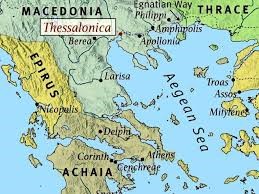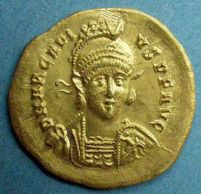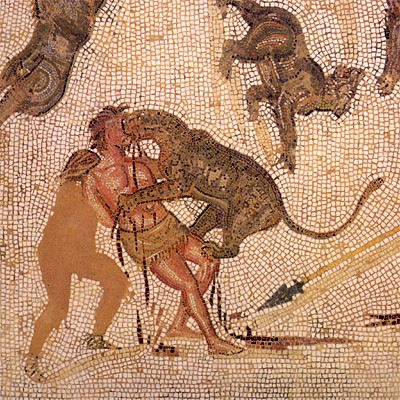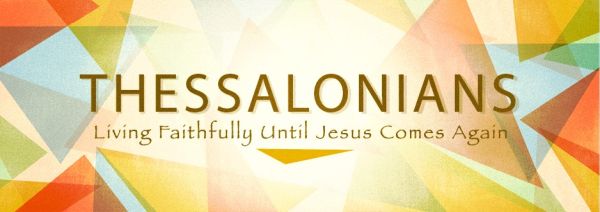Session 17 - 1 Thessalonians
Author
Paul, with Silas (Silvanus) and Timothy
Date of Composition
First Thessalonians is considered one of Paul's earliest epistles, if not the first. It is perhaps the oldest Christian writing. From the letter itself (3:1-6), and the record of his travels in Acts (Ac 17:10-18:11), it appears that Paul wrote it soon after arriving in Corinth on his second journey. This would put it somewhere around 51-52 A.D.
Purpose and Audience
Paul wrote to the believers in Thessalonica within a few months of leaving the city. In Acts, Luke recorded that Paul preached for "three Sabbath days" to the Jews in the local synagogue (Acts 17:2), his usual starting point in a new location. However, he then spent about three months in the city. Paul's ministry in Thessalonica touched not only Jews but Gentiles as well. Many in the church came out of idolatry.
On leaving Thessalonica under duress, Paul, Silas, and Timothy traveled to Athens by way of Berea. But after a short time in Athens, Paul felt the need to receive a report from the newly established church in Thessalonica, so he sent Timothy back to minister to the Christians there. He wanted to check on the state of the Thessalonians' faith, for fear that false teachers (there were many of these) might have infiltrated their number. However, Timothy returned with a good report, prompting Paul to send a letter of encouragement to the new believers. There is not a broad range of theology in the epistle; the church was benefiting from visiting ministry.


Background
Thessalonica was the largest city of Macedonia, situated on one of the best harbours in the northern Aegean, an intersection of four major roads and a meeting point of different religions. The city served as center of trade and commerce. It has been estimated that during Paul's time the population may have been as high as 200,000. Thessalonica was a city filled with idols, from which a convert to Christianity would have to turn. No doubt this gave rise to negative reactions from family members and friends. Most of the inhabitants were Greeks, but there was also a mixture of other ethnic groups, including Jews (according to Acts 17:1-10).
The make-up of the early church in Thessalonica was a combination of Jews, "God-fearers," and Gentiles (Acts 17:4; cf. 17:12).
The arrival of the Gospel in Thessalonica was opposed. When Paul began his sermon in the synagogue (as he often did) on the third Sabbath, the Jews started a riot (Acts 17:5). They were no doubt defensive of their traditions and jealous of the many converts Paul was making, so they gathered a mob and started a riot by claiming that Paul and Silas were claiming that there was another king besides Caesar (Acts 17:7). The reason the city got worked up over this was because it was a "free" city: if the populace were to become convinced of another king, Thessalonica would be in danger of losing its free status.

Paul's preaching caused a riot.
Fast forward. Despite the initial controversy, a church was established. When Timothy returned to Paul in Corinth (cf Ac 18:5), the news was mostly encouraging (3:6-7). Despite ongoing persecution of the Christian community (2:14) they had remained strong (2:13-16), and even proved themselves to be examples to Christians in other locations (1:6-8). Yet, as with any young church, they needed further instruction concerning Christian living (cf. 4:1-12). They also needed to be reassured that their loved ones who died would not miss out on the second coming of Christ (cf. 4:13-18).
Structure
| Paul's Greeting | - | 1:1 |
| Paul's Personal Thoughts | - | 1:2-3:13 |
| Paul's Practical Instructions | - | 4:1-5:22 |
| Paul's Benediction | - | 5:23, 24 |
| Final Remarks and Conclusion | - | 5:25-28 |
Paul opens his letter with a customary salutation ("Dear John, etc", 1:1), written to the Thessalonian believers. He then spends the next three chapters setting forth his relation to the Thessalonians (1:2-3:13). He does this apparently because Jews from the synagogue in Thessalonica were trying to discredit Paul, arguing that he was no different than those who spruiked their philosophies for profit on na´ve audiences.
The opponents attacked Paul on three grounds, with the aim of discrediting him and undermining his message:
- the Thessalonians' conversion was not genuine - Paul's message was not from God;
- Paul was a peddler for profit (like many philosophers and seers of the time); and
- the proof that Paul was not really interested in the Thessalonians was that he had not bothered to visit them again.
To these charges Paul now responds.
There is concern that some Christians have died without seeing Christ - have they missed out? is there hope for them? Also, some believers are so fixed on the future that they have stopped working; they need to get back to working regularly (4:12; 5:14).
Paul commands that his letter be read to the whole Christian community (5:27).
Key Issues
Enduring in the Face of Persecution
The Thessalonian church was born in controversy (Ac 17:6) and "great opposition" (2:2). It was a community that suffered persecution for following Christ (1:6, 2:14). Christians in Jerusalem (and elsewhere) were also suffering for their faith (2:15). Opposition included religious Jews, who rejected Jesus as the Messiah, or insisted that Christians follow Moses' law first; and from Gentiles, for turning their backs on the gods.

Despite the dangers (they were experiencing suffering, as Christianity was seen as a social and political threat) and pressures to go back to the old way of life (where many still had friends and family members), they stood strong in their faith in the Lord (3:7).
Those who followed traditional religions had temples and traditions in front of them; Christians were waiting for their Lord to return from heaven (1:9, 10), so they need to wait patiently, in faith. On the other hand, their faith and adherence to Christ are being noted by thankful Christian communities far and wide (1:7-10). They have received the Gospel in the face of opposition (1:6; 2:13, 14); such hostility is normal; but they have God's approval (1:4; 2:12).
Defining Traits of Genuine Godly Leadership
Almost hidden away in the middle of this letter is an amazing list of what made the early apostles the leaders they were; consider the following, in terms of your own life and calling:
- declare the word of God, despite opposition - 2:2
- no deceit, improper motives or trickery - 2:3
- speak on God's behalf, with confidence but motivated by His love - 2:4
- seek to please God, not people - 2:4
- no flattery, pretense or desire for financial gain - 2:5
- no quest for human praise - 2:6
- gentle among others, meeting their needs where possible, caring for them - 2:7
- prepared to share life, not just the message - 2:8
- work hard, seek to avoid being a burden - 2:9
- be godly, honest, faultless in behaviour and relationships with others - 2:10
- treat people with a genuine fatherly love - 2:11
- be an example to others, encouraging them to live right as Christians - 2:12

The Second Coming of Christ
1 Thessalonians provides Christians with the clearest biblical passage on the coming rapture (lit. catching up) of believers. Evidently, there were people in the church who either thought that this had already occurred, or were unsure as to whether they would be included, especially if they died before it took place. At the rapture, Christ will return for His people. The dead in Christ will rise first, while those still living will follow close behind. All believers will meet Jesus in the air to begin an eternity spent with the Lord (4:16-18). Paul taught the people that spiritual growth would be motivated by their hope in the ultimate return of Jesus Christ.
"For since we believe that Jesus died and was raised to life again, we also believe that when Jesus returns, God will bring back with him the believers who have died. We tell you this directly from the Lord: We who are still living when the Lord returns will not meet him ahead of those who have died. For the Lord, himself will come down from heaven with a commanding shout, with the voice of the archangel, and with the trumpet call of God. First, the believers who have died will rise from their graves. Then, together with them, we who are still alive and remain on the earth will be caught up in the clouds to meet the Lord in the air. Then we will be with the Lord forever. So, encourage each other with these words." (4:14-20)
This book is unique in that every chapter (a literary device added later) ends with a reference to the second coming of Christ (1:10; 2:19; 3:13; 4:13-18; 5:23). That day will come unexpectedly (5:2-6; Paul's words echo those of Jesus in Mt 24:43, Lk 12:39-40), so we need to live ready for it.
There is a warning here, and a promise:
"May he, as a result, make your hearts strong, blameless, and holy as you stand before God our Father when our Lord Jesus comes again with all his holy people." (3:13).
Growing in Holy Living
By clinging to our hope in Christ, we see results in our lives: avoiding sexual immorality, refusing to defraud others, appreciating Christians who serve on our behalf, refusing to repay evil for evil, rejoicing always, praying without ceasing, and giving thanks in all things - to name a few (4:3-7; 5:12-23). This list is not exhaustive, but it reminds us that every Christian should expect to grow in holiness over the course of his or her life.
The real test of a person's hope is what it does now. The hope we have in Christ is a living hope which grows and develops as we abide in His love. It is a living hope because it comes from a living resurrected savior. The hope we have is one of absolute certainty. It grows through life. It grows through perseverance which produces character and it is this character which produces hope, so it is self-renewing.
Christian living includes:
- staying away from sexual sin - 4:3-6
- obeying our spiritual leaders and taking their guidance seriously - 5:12, 13
- living in peace with others - 5:13
- working hard, not being lazy - 5:14
- encouraging those who are timid - 5:14
- taking tender care of those who are weak - 5:14
- being patient with everyone - 5:14
- not repaying evil for evil, but always trying to do good to all people - 5:15
- always being joyful - 5:16
- never ceasing to pray - 5:17
- being thankful in all circumstances, for this is God's will for those of us who belong to Christ Jesus - 5:18
- not stifling the Holy Spirit - 5:19
- not scoffing at prophecies - 5:20
- testing everything that is said - 5:21
- holding on to what is good - 5:21
- staying away from every kind of evil - 5:22.
What keeps us going? We are:
"... protected by the armour of faith and love, and wearing as our helmet the confidence of our salvation" (5:8).
God is the Source of True Love in our Hearts
Paul calls the Thessalonian believers "brothers" fourteen times.
"... may the Lord make your love for one another and for all people grow and overflow, just as our love for you overflows." (3:12).
"But we don't need to write to you about the importance of loving each other, for God himself has taught you to love one another. Indeed, you already show your love for all the believers throughout Macedonia. Even so, dear brothers and sisters, we urge you to love them even more." (4:9 10).
A Word of Encouragement
"Christ died for us so that, whether we are dead or alive when he returns, we can live with him forever. So, encourage each other and build each other up, just as you are already doing." (5:9-11).
"encourage": Gk. oikodomeo, to build (up from the foundation), to restore by building, to rebuild, repair; promote growth
We all need to be encouraged, often. There are temptations, pressures, personal circumstances and relationship challenges that face all of us, not to mention questions about what lies down the road.
For Reflection:
- Paul said that the Thessalonians had become an "example" to all the Christian believers in Greece, due to their stories of conversion, and their persistence in believing, in the face of opposition (1:7-9). They were moving against the current in their society, but they were not alone. The true church is bigger than what we know locally; it is a universal family. May our lives be examples to others.
- The Thessalonian Christians were living in faith, looking forward to Christ's return (1:10).
- The apostles were ministering through the power of God, not human means or techniques (1:5-7; 2:5, 6, 13). What are we relying on?
- Paul said, "our purpose is to please God, not people" 2:4. What motivates us?
- When you meet new Christians, do you try to encourage them and strengthen them in their faith (3:2)?
- We are called to live in a way that pleases God (4:1).
- We should be constantly encouraging, comforting, loving and building up one another; see also Hebrews 3:13. As Christians our feelings and relationships will continue to draw closer. Christians do not need to feel disconnected. Are there brothers and sisters in Christ whom you need to care for?
- All ministers of Christ need to show love, gentleness and the other characteristics Paul outlines in Chapter 2 - how can we learn from these traits and put them into practice?






